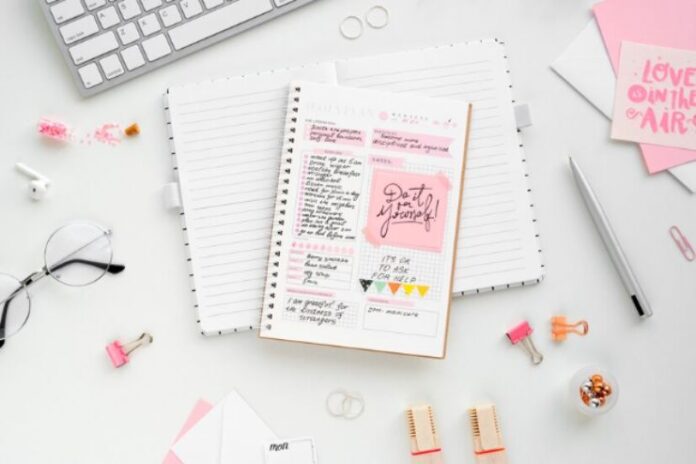Affiliate Disclaimer
Some links in this article are affiliate links. We may earn a small commission if you make a purchase through these links, at no extra cost to you. We only recommend products we find useful to our readersDo you feel that your busy lifestyle sometimes brings a lot of stress and anxiety? Mindfulness journaling can help establish a routine for self-care and a better emotional state. Journalling can reduce anxiety, develop a deeper awareness of yourself, and set you up for a mindfulness practice for life.
Mindfulness journals come in different sizes and shapes and can include guided prompts or offer a free-flowing writing space to help people think through their thoughts, manage stress, and cultivate gratitude.
Self-improvement and mental well-being are in vogue, and these journals are not just notebooks but highly structured and designed to support emotional well-being.
Let’s talk about how mindfulness journaling can help you with your mental health, key features to look for in a journal, and our top picks for the best mindfulness journals to help with anxiety and self-reflection.
No matter whether you’re just getting started or a seasoned writer, there is something that will help you create a meaningful and consistent practice.
How Mindfulness Journaling Supports Mental Well-Being
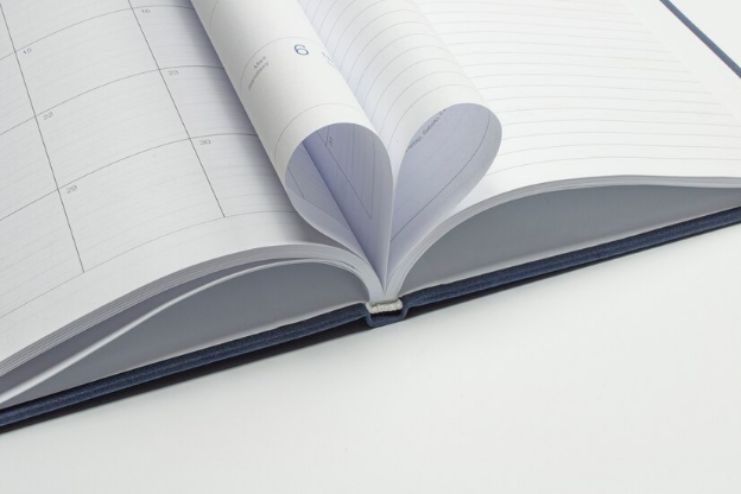
Mindfulness journaling is an effective way to improve mental wellness. There are numerous psychological advantages to journaling, such as managing anxiety, lowering stress, and overcoming depression through writing thoughts and feelings on paper.
Regular journaling enables one to express problems, fears, and concerns to gain perspective, enhancing mood and mental well-being.
Journaling also improves physical health, such as lowering blood pressure and improves lung and liver function.
These benefits are amplified when mindfulness is applied to journaling – through insights, clarity, healing, and overall well-being. Dedicating time to mindful journaling helps a person cultivate greater insight into his or her emotions, thereby promoting emotional balance and personal growth.
Also, Read: Mindfulness in Daily Life: Small Habits for Greater Peace and Presence
Key Features to Look for in a Mindfulness Journal

Selecting the right mindfulness journal can be very different from if journaling experience hasn’t included mindfulness before. Here are some key features to look for:
1. Structured Prompts vs. Blank Pages
Some provide guided prompts to help reflect on thoughts, emotions, and gratitude. It is perfect for a beginner or those who require structure.
Others contain blank pages for free form writing. This works for those who like an open-ended approach.
2. Daily Gratitude Pages and Self-Reflection Prompts
Daily gratitude journaling is associated with more happiness and a decrease in the level of stress. It helps ensure that you focus on the positive.
Self-reflection prompts delve deeper into emotions and thought patterns to improve emotional regulation.
3. Habit Trackers and Mood Logs
Some mindfulness journals contain habit trackers that enable users to establish positive habits.
Mood logs enable users to track emotional patterns over time, enhancing self-awareness and emotional equilibrium.
4. High-Quality Paper and Durable Design
A well-constructed journal has thick, smooth paper that won’t bleed ink through the pages, ensuring a great writing experience.
A journal’s durable binding and attractive design make it more pleasant to use and encourage consistency.
5. Portability and Ease of Use
A journal that is small can be carried in a bag or kept next to the bed for nighttime refelections.
Others come in digital form and can be used on a tablet or phone, depending on your preference.
Best Mindfulness Journals for Anxiety & Self-Reflection
We have put together a list of the best mindfulness journals to help you choose one that best suits your needs.
1. Intelligent Change The Five Minute Journal
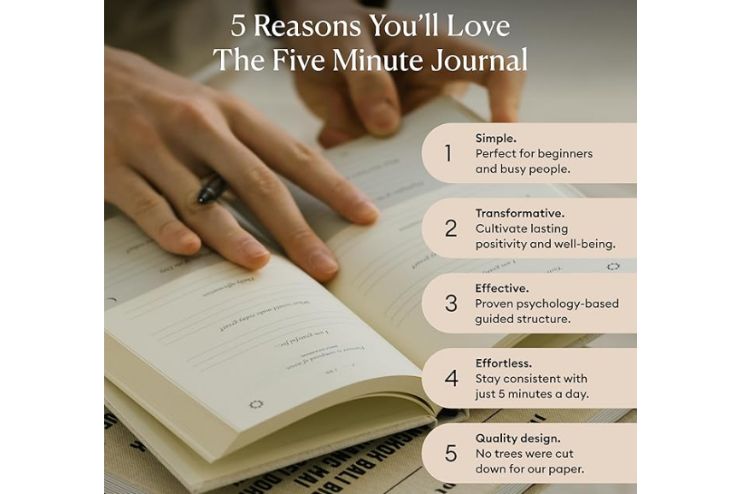
The Five Minute Journal is an easy way to develop an attitude of gratitude and mindfulness. Using structured prompts every day helps you begin with gratitude and ends the day reflecting on yourself. All this takes only five minutes of your busy day – making it easy to stay consistent with your journaling habit.
Key Features:
- Includes daily guided prompts for gratitude, affirmations, and reflection
- Updated to allow you to start at any time
- Quality aesthetic design with a linen cover
- Eco-friendly materials made with recyclable and sustainably sourced paper
Pros:
- Quick and easy-to-follow format, perfect for busy people
- Encourages a daily gratitude practice, which fosters positivity and self-awareness
- Available in several color options to suit your taste
Cons:
- Not much room for more in-depth journaling or stream-of-consciousness writing
- Six-month supply means you’ll have to buy again to continue
2. Self-Mastery Journal
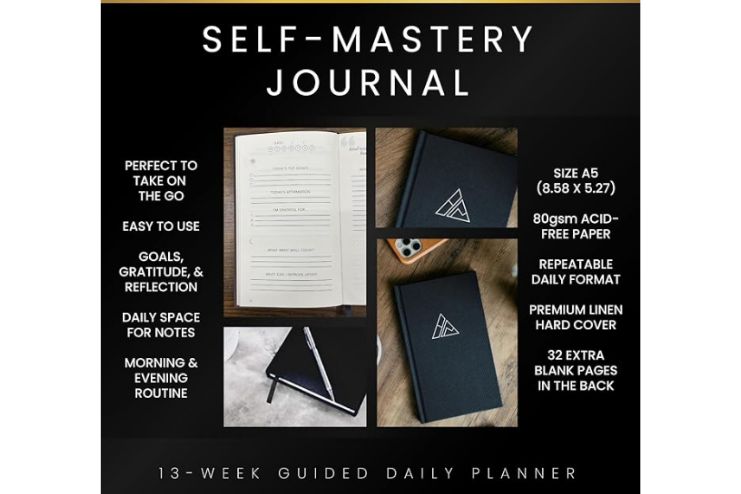
The Self-Mastery Journal by Realizations is a guided gratitude and productivity journal designed for both men and women. This 13-week undated planner helps users improve confidence, productivity, and mindfulness through structured prompts.
Features:
- Daily guided prompts for self-reflection, gratitude, and goal-setting
- 13-week structured format for personal growth and mindfulness
- Linen hardcover for durability and premium feel
- Compact size (5.27″ x 8.58″), making it easy to carry
Pros:
- Encourages productivity and goal-setting alongside gratitude practices
- High-quality, durable hardcover design
- Simple and structured layout, making it easy to follow
Cons:
- Only covers 13 weeks, requiring repurchase for long-term use
- May feel too structured for those who prefer free-form journaling
3. Worry for Nothing: Guided Anxiety Journal
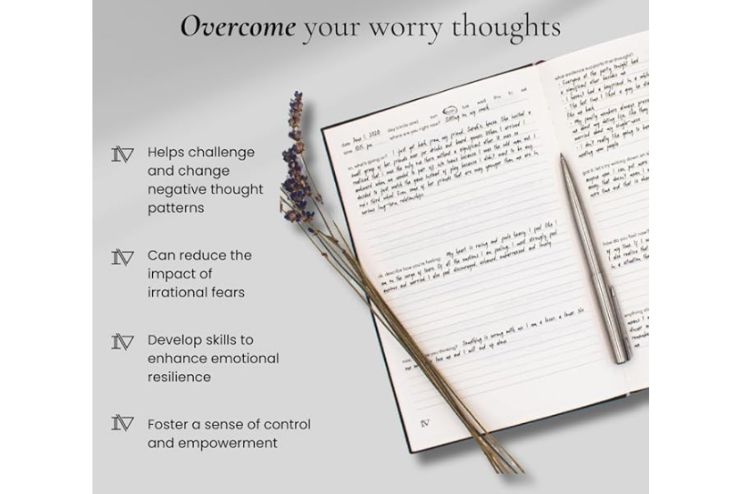
This anxiety relief guided journal is made using Cognitive Behavioral Therapy (CBT) techniques. It features structured prompts for enhancing mindfulness, monitoring emotional and physical sensations, and reframing anxious thoughts.
Features:
- Hard-cover design with CBT-based exercises
- 60 structured worksheets
- Compact travel-friendly size at 5-7/8″ x 8-1/4″
- High-quality 100 gsm paper
Pros:
- It employs therapist-backed CBT techniques to manage anxiety
- It builds habits through repeated journal prompts
- Stylish and professional-looking without explicit labels for anxiety
Cons:
- Limited space for freeform journaling
- It can be repetitive to users who require varied prompts
4. The Mindfulness Journal
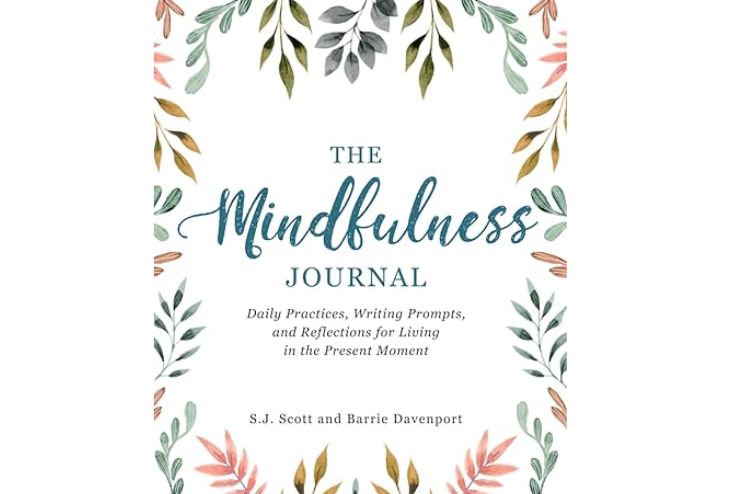
This guided journal uses daily writing prompts and reflections to decrease anxiety while fostering mindfulness. It offers 365 unique prompts across 52 weekly mindfulness themes.
Features:
- Daily mindfulness prompts
- Weekly themes for structured self-reflection
- Ample writing space
- Flexibility to do prompts at one’s own pace
Pros:
- Encourages daily mindfulness and stress reduction
- Structured yet flexible journaling using weekly themes
- Plenty of writing space for deep reflection
Cons:
- Might feel repetitive for experienced journalers
- Less focus on anxiety-specific CBT techniques
5. Switch Research Self-Love Journal
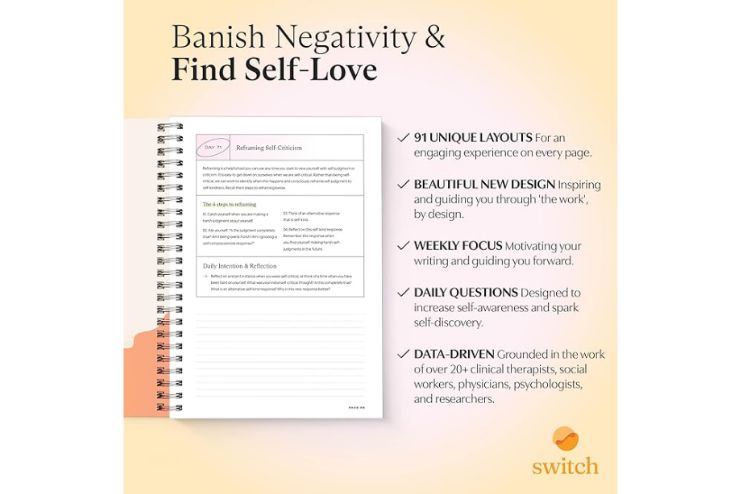
This guided self-care journal provides 91 days of structured prompts and mindfulness activities for self-love, emotional growth, and stress management. It also includes free access to an active supportive community and bonus video content.
Key features include:
- 13 weeks structured journaling journey
- Self-reflection daily exercise
- Mindfulness prompts
- Practices on gratitude
- Premium A4 paper
Pros:
- Evidence-based prompts for emotional well-being
- Themes in weekly intended personal development
- Access to private support community
Cons:
- Structured in nature rather than a free-flow journal
- It emphasizes self-love rather than anxiety-specific skills
Choosing the appropriate mindfulness journal depends on your individual needs and preferences. Some people look for prompts, the structure of the journal, and the time that they think will best help them in their journey of anxiety management and self-reflection.
Also, Read: Mastering Mindfulness: A Practical Guide for Busy Men
How to Build a Consistent Journaling Habit
Here are some practical strategies that can help you establish and maintain a regular journaling habit.
1. Set a Specific Time for Journaling
Consistency begins with routine. Choose a specific time each day to set intentions in the morning, or to reflect in the evening to make journaling a natural part of your schedule. Studies show having a routine helps to solidify habits and enhance mental well-being (R).
2. Start Small and Keep It Simple
No, you don’t have to write an essay every day. You can start with a few sentences or bullet points. Try simple prompts like the following:
- What am I grateful for today?
- What’s one positive thing that happened?
- How do I feel right now?
3. Use a Guided Journal for Structure
If free form writing is too overwhelming, then guided mindfulness journals provide structure through prompts, gratitude exercises, and reflection questions. Most top-rated journals offer specific themes for stress relief and emotional clarity.
4. Make It Fun
Create a relaxing atmosphere for journaling. Light a candle, make a cup of tea, or play soothing music. To make the process more engaging, use a pen and journal that you enjoy writing with.
5. Break Through Writer’s Block
If you get stuck, try these strategies:
- Use a journaling app for prompts
- Write a letter to your future self
- Sketch or doodle if words don’t come easily
6. Connect Journaling to Another Habit
Associate journaling with another daily habit, like your morning coffee or bedtime routine. Habit stacking, the process of attaching a new habit to an existing one, makes it much easier to remember the new habit you’re trying to add to your routine.
7. Track Your Progress and Celebrate Wins
Maintain a small tracker at the back of your journal where you mark down the days you wrote something. Reward yourself after completing a week or month of consistent journaling to reinforce the habit.
Final Thoughts: Is a Mindfulness Journal Right for You?
Mindfulness journaling is a simple yet effective tool for reducing anxiety, gaining emotional clarity, and fostering personal growth. Whether you’re a beginner looking for structure or an experienced journaler seeking deeper reflection, the right journal can help you cultivate mindfulness and self-awareness.
While consistency may take time, even small efforts can significantly impact mental well-being. If you’re looking for a practical way to manage stress and enhance self-reflection, investing in a mindfulness journal is a worthwhile step toward a more balanced and mindful life.
References
- https://www.urmc.rochester.edu/encyclopedia/content?ContentID=4552&ContentTypeID=1
- https://positivepsychology.com/benefits-of-journaling/
- https://www.mindful.org/how-mindful-journaling-can-help-your-daily-practice/
- https://gretchenrubin.com/articles/jump-start-your-habit-of-keeping-a-journal/
- https://www.thefreelancewritersguide.com/blog/how-to-stay-consistent-with-journaling
- https://dayoneapp.com/blog/journaling-habit/
In this Article












